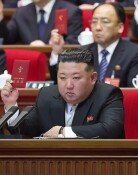[Editorial] Remembering Former Pres. Kim Dae-jung
[Editorial] Remembering Former Pres. Kim Dae-jung
Posted August. 19, 2009 08:45,
Former President Kim Dae-jung died yesterday at age 85. Though he endured a tough life in leading the democratic movement against authoritarian governments, he eventually succumbed to old age. May he rest in peace.
Few figures lived a life as dramatic and left many legacies like Kim in modern Korean history. Born to a poor farmer, he was a six-time lawmaker before being elected the 15th president of the Republic of Korea despite having just a high school diploma. He helped the government transfer power to his successor in a democratic way for the first time in the countrys history. He also helped the economy overcome the 1998 Asian financial crisis in a relatively short period of time. The 2000 inter-Korean summit was held for the first time in half a century of national division under his presidency, and Kim became the first Korean to receive the Nobel Prize.
Kim was a politician with a great presence in overcoming challenges with firm determination. He was elected to the National Assembly in his fourth attempt. As such, he was a man with persistence. He thoroughly prepared for everything. He always read books and studied, and wrote down what others said. This is why he knew so much about everything. Since he always practiced looking in the mirror before making an important speech, he rarely made a mistake.
Kim lived a tough life until becoming president. He was a great leader to the people yearning for democracy, but an eyesore to the military governments led by Park Chung-hee and Chun Doo-hwan. He was put under house arrest 55 times and imprisoned for six years. He was banned from political activity and spent time in exile in Japan and the United States. While in Japan, he was kidnapped by Korean spy agency and taken back to Korea. Though sentenced to death for an alleged rebellion conspiracy, namely the 1980 pro-democratic movement in Gwangju, he was rescued by the U.S. government. His contributions to ending military rule with the 1992 election of Kim Young-sam as Koreas first civilian president and advancement of national democratization will be forever remembered by the people.
Kim Dae-jung, Kim Young-sam and Kim Jong-pil formed the three Kims that dominated Korean politics for decades. Kim Dae-jung was a victim of deep-rooted regional division but at the same time a beneficiary. In the countrys first direct presidential election in 1987, he disappointed the people by failing to agree on a unified candidate. Unfortunately, Korean politicians have acted more in their political interests rather than for ideology or policy. The three Kims era is over, but regional strife, politicians changing parties for their own interests, and an extreme political culture that denies representative democracy still remains. In this regard, Kim Dae-jung gave politicians tasks to tackle.
With progress in democratization, frequent ideological conflict in society is another serious issue. Regrettably, Kim Dae-jung could have done better when the anti-U.S. beef protests took place last year and the rallies in the wake of former President Roh Moo-hyuns death this year. As a former president, Kim Dae-jung could have won more respect if he took the lead in unifying the people rather than encouraging political divisions by calling incumbent President Lee Myung-bak, who was democratically elected, as a dictator.
His policy toward North Korea received mixed reviews. He created a reconciliatory environment between the two Koreas through the 2000 inter-Korean summit and promoted people exchanges and cooperation and the reunion of separated families. Though business cooperation at the Kaesong industrial complex and tours to Mount Kumgang are being hampered by the Norths provocations and stubbornness, they will be remembered as part of his legacy if they are resumed. Yet he secretly gave more than 450 million U.S. dollars to Pyongyang in return for holding the summit, and failed to change the North in the way he intended to through his sunshine policy. By sticking to the policy, he helped the communist regime develop nuclear weapons and missiles, causing internal division in South Korea.
On previous persecutions of him, Kim Dae-jung paid extra attention to human rights while president. Improvement in human rights came when he was in office. Contrary to his reputation as a human rights president, however, he failed to end illegal eavesdropping and almost ignored human rights abuses in the North. History will clarify the controversy over whether he retaliated against media that criticized him by ordering tax audits on them.
Creating glory and disgrace and praise and criticism, Kim Dae-jung is now part of history. His footsteps hopefully can serve as the groundwork for the countrys democratic development, economic prosperity, and peaceful reunification. May his funeral a ceremony of saying good-bye amid the peoples mourning be conducted solemnly and sincerely.







